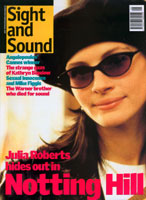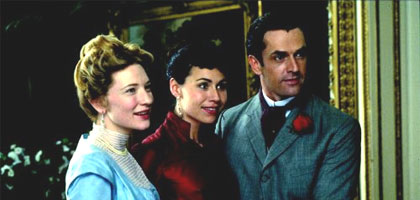
An Ideal Husband
UK/USA 1999

Reviewed by Peter Matthews
Synopsis
Our synopses give away the plot in full, including surprise twists.
London, 1895. Sir Robert Chiltern MP is happily married to the high-minded Gertrude. One evening, the Chilterns hold a reception. Among the guests are Sir Robert's sister Mabel, his best friend Arthur Goring - and Mrs Laura Cheveley. Laura asks Robert for his public support of an Argentinian canal scheme in which she has invested heavily. Robert turns her down, but Laura reveals she has an incriminating letter he once wrote. She threatens to expose the fraud on which Robert built his wealth if he will not do her bidding. Robert agrees to back her scheme in the Commons.
Gertrude persuades Robert to write to Laura and withdraw his promise, whatever it is. Robert confides his woes to Arthur. Receiving Robert's note, Laura visits Gertrude and reveals to her Robert's secret. Disillusioned with her "ideal husband", Gertrude sends an urgent note to Arthur, requesting a private interview. Expecting Gertrude, Arthur instructs his butler Phipps to admit an unidentified lady and no one else. When Mrs Cheveley unexpectedly arrives, Phipps escorts her to Arthur's study, where she steals Gertrude's note. Now Robert appears, desperate for advice. Hearing a noise in the study, he finds Laura and storms out. Laura suggests a wager to Arthur: she will return Chiltern's letter if he condemns the canal scheme in parliament; if he endorses it, Arthur must marry her.
Robert condemns the scheme, and Laura hands the letter over to Arthur - but posts Gertrude's compromising note to Robert. Mabel claims the note was from her to protect Gertrude. Arthur proposes to Mabel and she accepts but Robert objects to the engagement, believing Arthur is conducting an affair with Mrs Cheveley. Gertrude comes clean and Robert is delighted to discover his perfect wife suffers from human frailty.
Review
A few years ago, Oliver Parker directed a smooth, uninspired film version of Othello, notable for some radical pruning of the text and an attempt to 'open out' the play that consisted largely of velvety shots of torch-lit gondolas. Sadly, conspicuous consumption plus the odd camera flourish do not a memorable Shakespeare adaptation make. For all its prettiness, Parker's Othello ended up in a dull halfway house between theatre and cinema. His new translation of Oscar Wilde's An Ideal Husband shows a similar infirmity of purpose, but with the opposite result. Far from being insufficiently cinematic, it isn't stagy enough. While Shakespeare's muscularity arguably lends itself to full-blooded spectacle, the whole point of Wilde lies in his coruscating effeteness. The overbred dandies of his plays turn tinkling triviality into a badge of honour - they are always acting, even in their own drawing rooms. A smart Wilde production should pursue the air of stilted theatricality to the very limit.
Wilde's epigrammatic prolixity poses obvious hazards for film-makers. Just about the only adaptation to strike the requisite note of overripe preciousness was Anthony Asquith's splendidly stagnant The Importance of Being Earnest (1952). Parker seems to have assumed that Wilde at full throttle would antagonise rather than captivate the
Now and then, Parker scores a scrupulously balanced composition (as in the ceremonial two-shots announcing the reunion of the estranged Chilterns), and it becomes clear that he's fishing about for an equivalent to Wilde's formalism. But on the whole, his cinematic elaborations work to sentimentalise the tone. Where Wilde's imponderable ironies keep you guessing as to whether his characters are quite the twittering creatures they appear, the realism inseparable from 'opening out' implicitly obliges you to take them as human beings.
Still, the actors are superbly accoutred down to the last footman, projecting high elegance even when the direction doesn't. Wearing his new camp image like a queenly mantle, Rupert Everett performs an immaculate turn as the closet moralist Arthur Goring. Cate Blanchett makes an exquisitely distressed Lady Chiltern, while Minnie Driver gurgles and pouts as if possessed by the phantom of Joan Greenwood. However, the show belongs to the phenomenally gifted Julianne Moore, who goes from playing a suburban housewife (Safe) to a porn star (Boogie Nights) to the conniving grande dame here, and manages to be fresh and different every time. Perhaps in the interest of softening the role, Mrs Cheveley has been robbed of the great coup de théâtre when she is exposed. But even so, Moore gives the best display of female Machiavellianism since Bette Davis held court over The Little Foxes (1941).
Credits
- Producers
- Barnaby Thompson
- Uri Fruchtmann
- Bruce Davey
- Screenplay
- Oliver Parker
- Based on the play by
- Oscar Wilde
- Director of Photography
- David Johnson
- Editor
- Guy Bensley
- Production Designer
- Michael Howells
- Music
- Charlie Mole
- ©The Ideal Film Company Ltd
- Production Companies
- Icon Entertainment International and Pathe Pictures in association with the Arts Council of England present a Fragile Film in association with Icon Productions and Miramax Films
- Supported by the National Lottery through the Arts Council of England
- Executive Producers
- Susan Landau
- Ralph Kamp
- Andrea Calderwood
- Co-producers
- Nicky Kentish Barnes
- Paul Tucker
- Production Supervisor
- Waldo Roeg
- Unit Production Manager
- Jo Farr
- Location Supervisor
- Sarah Lee
- Location Manager
- Simon Crawford Collins
- Post-production Supervisor
- Tania Windsor Blunden
- Assistant Directors
- Richard Hewitt
- Toby Sherborne
- Matthew Penry-Davey
- Crowd:
- Marshall Leviten
- Script Supervisor
- Jean Bourne
- Casting Director
- Celestia Fox
- Text Adviser
- Russell Jackson
- Camera Operator
- Martin Kenzie
- Digital Visual Effects
- The Magic Camera Company
- Special Effects
- Paul Dimmer
- Art Director
- Rod McLean
- Set Decorator
- Katie Lee
- Gallery Paintings
- James Gemmill
- Draughtsman
- Paul Westacott
- Storyboard Artist
- Jim Staines
- Costume Designer
- Caroline Harris
- Costume Supervisor
- Ali Goss
- Wardrobe Masters
- Joe Hobbs
- Marcus Love-McGuirk
- Make-up/Hair Design
- Peter King
- Chief Make-up Artist
- Elizabeth Tagg
- Make-up/Hair Artists
- Tamsin Dorling
- Veronica Brebner
- Kirstie Stanway
- Chief Hairdresser
- Paul Gooch
- Hair Artist
- Jamie Pritchard
- Titles/Film Opticals
- The Magic Camera Company
- Title Design
- Tom Hingston Studio
- Frameline
- Music Conductors/
Orchestrations - Nick Ingman
- Geoff Alexander
- Additional Orchestrations
- John Bell
- Mike Townend
- Orchestra Leader
- Gavyn Wright
- Music Supervisor
- Eliza Thompson
- Music Editor
- Mike Higham
- Music Recorder/Mixer
- Steve Price
- Choreography
- Sue Nye
- Sound Recording
- Peter Lindsay
- Re-recording Mixer
- Adrian Rhodes
- Supervising Sound Editor
- Max Hoskins
- Sound Effects Editor
- Chris Ackland
- ADR
- Crowd Group:
- Marcella Riordan
- Foley
- Artists:
- Peter Burgiss
- Andi Derrick
- Editor:
- Miriam Ludbrook
- Fencing Arranger
- Bill Hobbs
- Cast
- Cate Blanchett
- Lady Gertrude Chiltern
- Minnie Driver
- Mabel Chiltern
- Rupert Everett
- Arthur Goring
- Julianne Moore
- Mrs Laura Cheveley
- Jeremy Northam
- Sir Robert Chiltern
- John Wood
- Lord Caversham
- Lindsay Duncan
- Lady Markby
- Peter Vaughan
- Phipps
- Jeroen Krabbé
- Baron Arnheim
- Ben Pullen
- Tommy Trafford
- Marsha Fitzalan
- Countess
- Neville Phillips
- Mason
- Nickolas Grace
- Vicounte de Nanjac
- Simon Russell Beale
- Sir Edward
- Anna Patrick
- Miss Danvers
- Delia Lindsay
- Lady Basildon
- Denise Stephenson
- Gwendolen
- Charles Edwards
- Jack
- Nancy Carroll
- Cecily
- Andy Harrison
- Algernon
- Jill Balcon
- Lady Bracknell
- Janet Henfrey
- Miss Prism
- Toby Robertson
- Canon Chasuble
- Michael Culkin
- Oscar Wilde
- Oliver Parker
- Bunbury
- Douglas Bradley
- Brackpool
- Stephen May
- Burlington
- Susannah Wise
- young mother
- Peter Parker
- MP 1
- Oliver Ford Davies
- Sir Hugo Danforth
- Neil Mendoza
- MP 2
- John Thompson
- the speaker
- Certificate
- tbc
- Distributor
- Pathé Distribution
- tbc feet
- tbc minutes
- Dolby
- In Colour
